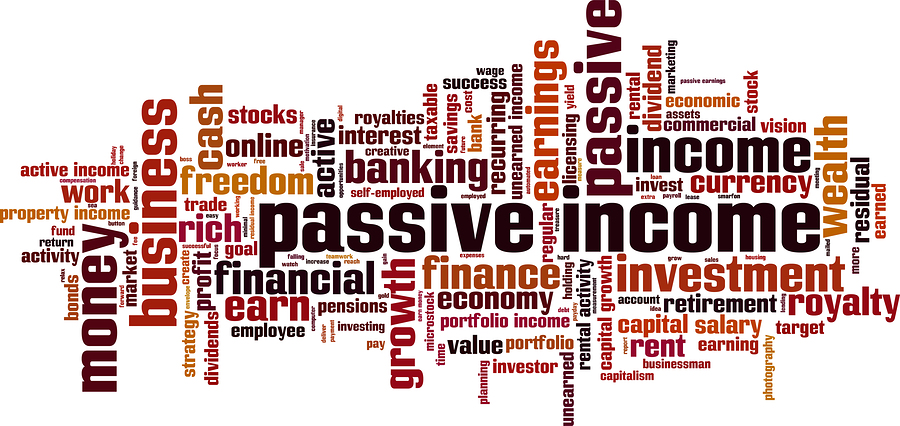What is Passive Income?
How much do you earn when you’re sleeping? If you’re like most people, then the answer is likely nothing. However, there are people who do actually earn money whilst they sleep or when they’re not actively working. Does that sound intriguing?
When it comes to earning money, there are two main categories which, broadly speaking, are active income and passive income.
Active Income
Active income is essentially when you get paid for your time and energy. We might not know it as ‘active income’, but we are all familiar with the 9-5 job, which provides us with an income. You go to work each day and earn the same salary each month. Most people live their lives that way and there’s nothing wrong with that.
You might have a more flexible working pattern if you receive a fee based on a service you might provide, for instance, if you work as a web or graphic designer. The income is active as you are required to provide your time and energy, in order to earn that money. If you stop working or stop providing that service, then the income stops.
Passive Income
Passive income, on the other hand, is an income which doesn’t require your continual time and energy. What could be better, financially speaking, than generating an automatic income, which you don’t have to put your constant time and energy towards?
Neglecting Active Income
Passive income should not be looked upon as an excuse for laziness. Firstly, those who are able, have a God-given responsibility to work, “If anyone will not work, neither shall he eat” (2 Thessalonians 3:10). Secondly, if you want to earn a passive income simply because you don’t want to have to work for a living, then it is likely that you’re not prepared to work hard enough to establish a passive income in the first place.
Active income is the first step towards creating a passive income, as it requires some money up front. You are also required to invest your time and energy upfront, in order to establish it. Therefore a lazy attitude does not lend itself towards establishing a passive income. A brief survey of those who have successfully established a passive income will generally reveal driven and dedicated individuals who have given a lot of time, and energy before receiving any returns. If generating a passive income was easy, then everyone would be doing it. However, that does not mean that it is out of reach of those who are willing to work at it.
Reasons for Establishing a Passive Income
Money does not buy happiness. It is true that we need to make a certain amount of money in order to live comfortably, which brings with it a certain level of happiness. Research has shown that a lack of money brings unhappiness, but an overabundance of money does not have the opposite effect. The idea that the more money you have, the happier you are is really a delusion of our society.
However, a passive income can provide you with a measure of financial freedom. It could allow you to give more to good causes or volunteer more of your time. It could allow you to accept a job that you are more passionate about, even though it pays less. Likewise, you could start a business in an area you are passionate about, whilst subsidising it with a passive income. You could spend more time with your family, particularly if any of them require caring for. It could allow you to travel more and experience more of the world. Maybe you could write that book you have always wanted to write, but never found the time for. Finally, a passive income could allow you to pay off your mortgage and other financial obligations quicker and remove some of these financial strains, sustaining you when your retirement eventually comes.
Property Investment
One example of a passive income stream is property investment. If you have sufficient funds, you could buy a property for the purposes of renting it out. If you aren’t in a position to buy a property, you could rent out any spare rooms you may have in your current property. The idea would be that the rent received would cover some, if not all of your bills, depending upon how many rooms you let out.
Is your property an asset or a liability? If you own a property and are losing money every month from the mortgage and bills, then it is a liability. However, if you rent out one or more rooms and you receive more money than your outgoings, then your property becomes an asset, you can live there for free and earn income from it each month. The income you make is passive as you don’t have to spend time and energy earning it, bar some initial work to establish the rental. You can literally earn money whilst you sleep.
Vending Machines
My brother runs a vending machine business, as a side line to his full-time employment in the Fire Service. It’s really a semi-passive income, as he has to monitor his sales and replenish the stock in his machines. He also had to put in the work upfront in establishing a business plan, selecting the right locations, meeting with businesses and purchasing the machines. However, he has minimal overhead costs; he can sell his products at competitive prices and he has constant footflow.
Conclusion
Have you ever thought of earning a passive income, and making your money work for you, rather than simply you working for your money? Maybe, currently, 100% of your income is active income. What could you do get to the stage where 95% or 90% of your income is active income and 5% or 10% of your income is passive income?

